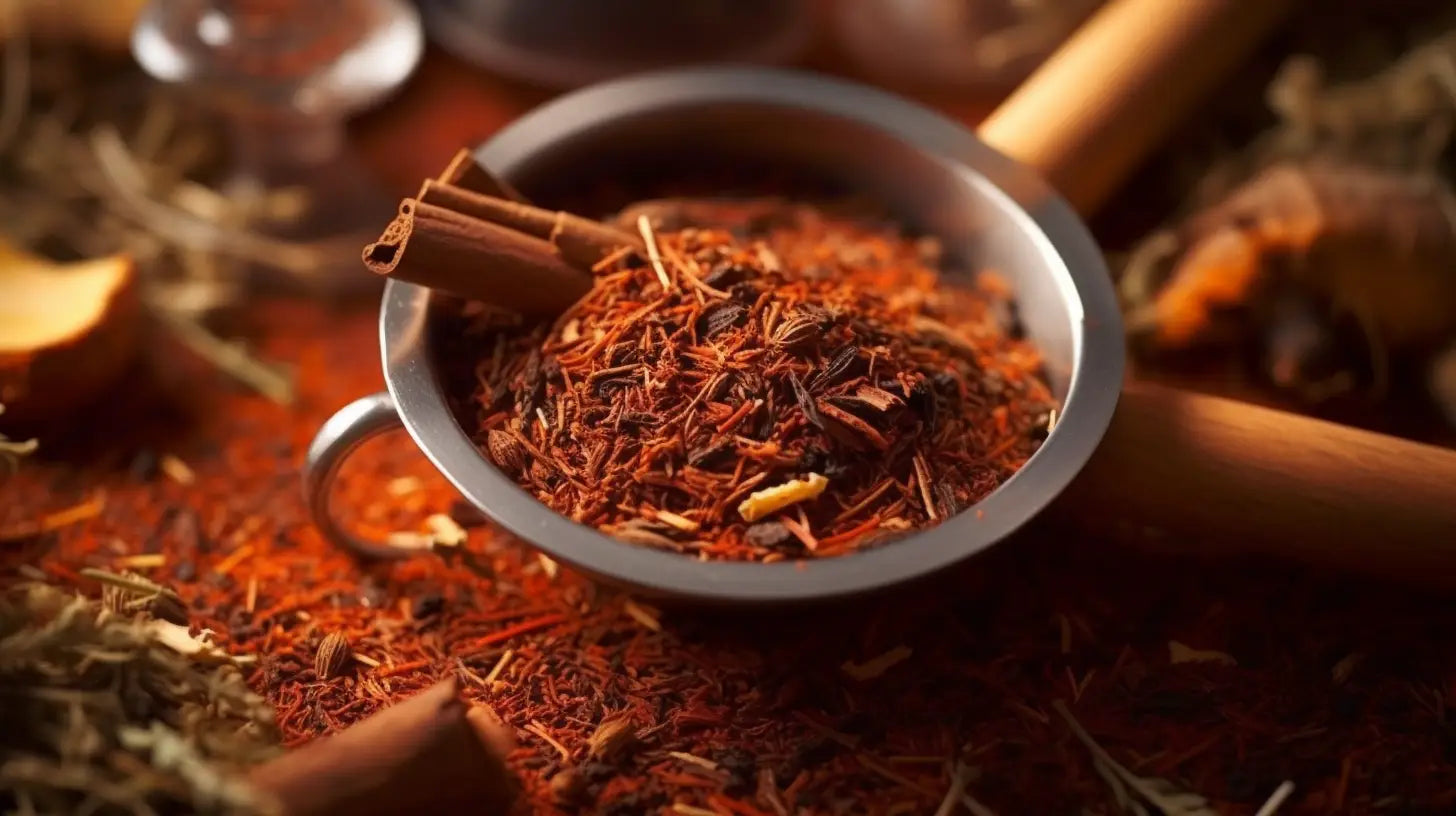Health Benefits of Rooibos Tea: A Scientific Overview

Rooibos tea, derived from the Aspalathus linearis plant native to South Africa, has garnered attention for its unique flavor profile and a wide array of health benefits.
Here we delve into the quantifiable advantages of incorporating Rooibos tea into your daily tea routine, supported by scientific research and evidence.
From its rich antioxidant content to its potential impact on various aspects of well-being, we unveil the scientific insights behind the remarkable health benefits of Rooibos tea.
-
Antioxidant Powerhouse: Rooibos tea is renowned for its high concentration of antioxidants, including aspalathin, nothofagin, and quercetin. These powerful antioxidants help neutralize free radicals, reduce oxidative stress, and protect the body against cellular damage. Studies have demonstrated that Rooibos tea exhibits significantly higher antioxidant activity compared to other herbal teas, making it a potent ally in combating chronic diseases and promoting overall health. [1]
-
Anti-Inflammatory Effects: Research has shown that Rooibos tea possesses anti-inflammatory properties, attributed to its polyphenolic compounds. The consumption of Rooibos tea has been associated with a reduction in pro-inflammatory markers, such as interleukin-6 (IL-6) and tumor necrosis factor-alpha (TNF-α). By mitigating inflammation, Rooibos tea may contribute to the prevention of chronic inflammatory diseases, including cardiovascular disease and diabetes. [2]
-
Cardiovascular Health: Several studies have explored the impact of Rooibos tea on cardiovascular health markers. Rooibos tea consumption has been associated with a decrease in LDL cholesterol levels and an increase in HDL cholesterol, promoting a healthier lipid profile. Additionally, Rooibos tea has demonstrated blood pressure-lowering effects, potentially reducing the risk of hypertension and cardiovascular diseases. The flavonoids present in Rooibos tea, such as quercetin and luteolin, contribute to its cardioprotective properties. [3]
-
Digestive Benefits: Rooibos tea has been found to possess anti-spasmodic properties, which can help alleviate digestive discomfort and cramping. It may also exhibit anti-ulcerative effects, protecting the stomach lining against damage. Furthermore, Rooibos tea's potential prebiotic properties suggest it may support a healthy gut microbiome, enhancing digestive function and overall gut health. [4]
-
Skin Health and Anti-Aging: Rooibos tea's antioxidant and anti-inflammatory properties extend to the realm of skin health. Research indicates that Rooibos tea extracts can protect skin cells against oxidative stress and prevent collagen degradation, promoting a youthful and healthy complexion. Moreover, Rooibos tea extracts have shown potential in reducing the appearance of wrinkles and improving skin elasticity. [5]
-
Immune-Boosting Potential: Rooibos tea's immune-boosting effects are attributed to its polyphenolic compounds, which possess antimicrobial and antiviral properties. Studies have suggested that Rooibos tea extracts may enhance immune cell activity, supporting the body's defense against infections and strengthening immune responses. [6]
Scientific research highlights the quantifiable health benefits of Rooibos tea, providing compelling evidence of its antioxidant power, anti-inflammatory effects, cardiovascular support, digestive benefits, skin health promotion, and immune-boosting potential.
Incorporating Rooibos tea into your daily routine can be a flavorful and health-conscious choice. Enjoy the soothing taste and experience the scientifically backed advantages of Rooibos tea as you embark on a journey toward improved well-being and vitality.
---
References:
- Marnewick JL, et al. J Agric Food Chem. 2004 Oct 20;52(21):6385-91.
- McKay DL, Blumberg JB. J Agric Food Chem. 2007 Feb 21;55(4):1370-6.
- Joubert E, et al. Food Funct. 2014 Jun;5(6):1281-91.
- Johnson R, et al. Food Res Int. 2020 Sep;135:109267.
- Baba H, et al. Int J Mol Sci. 2019 Oct 25;20(21):5294.
- Muller CJ, et al. Phytomedicine. 2018 Jan 15;38:76-84.









